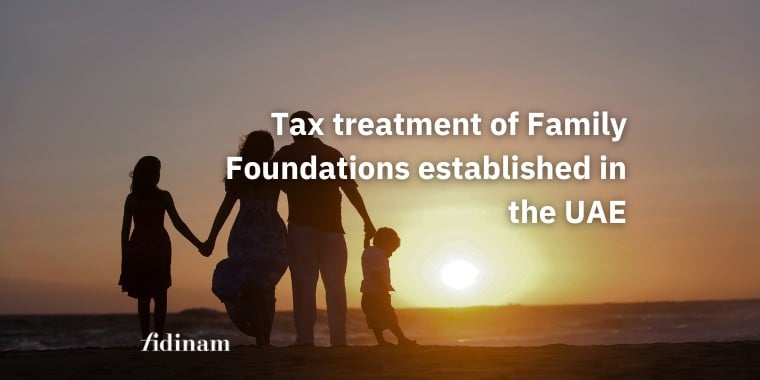
Since 2017 the concept of foundation has been introduced in the UAE legal framework and nowadays there are three different free zones, namely ADGM, DIFC and RAKICC, where it is possible to establish a Family Foundation.
The scope of this article is looking at tax implications pertaining those foundations whose activity shall be limited to holding a portfolio of securities for the benefit of the beneficiaries.
FTA: Federal Tax Authority
CT: Corporate Tax
CTL: Federal Decree-Law 47 of 2022 – the Corporate Tax Law
CTG: Corporation Tax Guide published by FTA on 10th September 2023
UAE foundations are incorporated bodies with a separate legal entity.
Being juridical persons incorporated or otherwise established or organized under the applicable legislation of the UAE, including ADGM, DIFC and RAKICC regulations, the UAE foundations fall under the definition of Taxable Person and Resident Person in accordance with art. 11 of CTL and in principle are subject to CT at the same extent of any other company incorporated in the UAE.
As explained in the CTG, where foundations “are merely used to hold and manage personal assets and wealth on behalf and for the benefit of beneficiaries who are natural persons, this will result in an inconsistent Corporate Tax treatment compared with if instead the natural persons were to hold and manage the assets directly”. For this reason, the legislator has introduced a special regime for the “Family Foundations’ as explained below:
Art. 17 CTL allows Family Foundations to apply to be treated as “Unincorporated Partnerships” if all the following conditions are met:
Additional conditions apply if one or more of the beneficiaries are public benefit entities (Ministerial Decision 127 of 2023 Art. 5 .
The CTG clearly confirms that “If the application is approved, the Family Foundation will be treated as tax transparent and the beneficiaries would be seen as directly owning or benefiting from the activities and assets of the Family Foundation”.
Transparency applies for tax purposes while for legal purposes the owner of the assets remains the Family Foundation.
Assuming a Family Foundation whose beneficiaries are only identified of identifiable natural persons, the analysis has to be focused on tax treatment applicable to such natural persons.
A natural person is subject to the CT only if he conducts Businesses or Business Activities in the UAE and earns a turnover from such activities in excess of one million AED within a calendar year (Art. 11 CTL and Art. 2 Cabinet Decision 49 of 2023).
Moreover clause 2 of Art. 2 of Cabinet Decision No 49 of 2023 states that Personal Investment income is not considered Businesses or Business activities subject to the CT.
Personal Investment is defined as “Investment activity that a natural person conducts for their personal account that is neither conducted through a Licence or requiring a Licence from a Licensing Authority in the State, nor considered as a commercial business in accordance with the Federal Decree-Law No. 50 of 2022.”
The outcome is that incomes earned by a Family Foundation that successfully submits the application to be treated as tax transparent and who is not conducting a Business or Business Activity, are not subject to CT neither in the hands of the Foundation nor in the hands of individual beneficiaries.
The implementation of CT has an impact on all legal entities either registered or effectively managed in the UAE, including the so-called offshore entities that are sometimes used in the region as SPV for the holding of personal assets.
UAE foundations may provide a tax efficient instrument to hold and manage personal assets and wealth on behalf and for the benefit of family members replacing the off-shore entities often used in the past years.
All content © . All Rights Reserved.